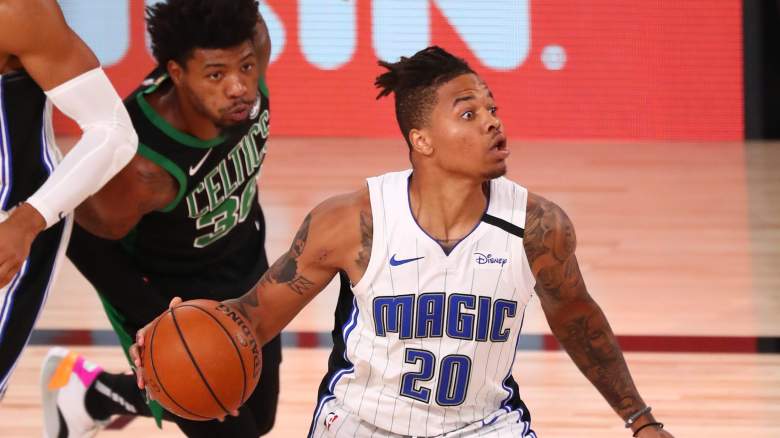
Getty Markelle Fultz, Orlando Magic
Stop us if you’ve heard this before: The Celtics enter the upcoming season sitting on a sizable traded-player exception. In fact, they’ve got three to their credit.
None is as big as the TPE that dominated chatter around the team last year, the NBA-record $27.5 million exception from the Gordon Hayward sign-and-trade. But there is one from the Evan Fournier free-agent signing, with the Knicks, which yielded a $17 million exception the Celtics can fill with a player up to that level of salary.
There is also $9.7 million available for the trade of Tristan Thompson to Sacramento. And a $5 million hole from the Kemba Walker deal. The Celtics can use each of those exceptions to acquire one or multiple players in a trade without sending salary back, but the exceptions cannot be combined—there is no creating a $31.7 million mega-exception, only three separate exceptions.
We’re starting to get some concepts of what the Celtics might do with those exceptions, if anything. Let’s have a look at what is being suggested:
Option 1: Bring on a Veteran for Bench Help
At Bleacher Report, there is the possibility of adding veteran bench depth. If Robert Williams wins the starting center job, as writer Grant Hughes points out, the Celtics will have Josh Richardson and Al Horford on the bench, so there will be elder pieces there. But if Horford is the center, the bench gets a lot younger.
What to do? Three names fit into the Fournier exception rather nicely: Markelle Fultz of the point-guard heavy Magic could help with the Celtics’ backcourt problem; Washington big man Davis Bertans, who was disappointing last year (11.5 points in 25.7 minutes) after signing a five-year, $80 million contract; and 32-year-old Spurs forward Thaddeus Young.
Of the three, Young makes the most sense. Fultz is only 23 and while his turnaround in Orlando is a nice story, he is still a terrible perimeter shooter (26.5% from the arc in his career). Bertans is simply far too hefty of a financial commitment than the team should be willing to make.
But Young is an ideal mentor, with Horford, for young Celtics stars Jaylen Brown and Jayson Tatum, while also helping in a variety of ways on the floor—he averaged 12.1 points, 6.2 rebounds and 4.3 assists for Chicago last year. Only if the Spurs decide to tank would they consider trading Young, but he would be an excellent fit in Boston.
Option 2: Facilitate a Deal for Draft Picks
Brian Robb at MassLive has a different take on a possible direction for the TPE—rather than just absorbing a salary, the Celtics could gain some draft capital by getting involved in the messiest situation currently going in the NBA, the Sixers-Ben Simmons saga.
That probably won’t help the team as it stands now. But the Sixers are going to look to move a gargantuan amount of salary in whatever Simmons deal winds up happening, and could look to dump off some of the financial impact by giving away a player they don’t want. If the Celtics offer that help, they would look to be rewarded in the draft.
“That type of scenario could open the door to Boston landing an extra draft pick or two by just taking on a contract needed to make a bigger Simmons trade work under NBA rules,” Robb noted.
Option 3: Do Nothing, Let the TPEs Expire
Not to be a bummer, but this is a real possibility.
Brad Stevens will not look to make a deal just to make a deal. And if no deal that makes sense for the team, Stevens will have to stand pat. In that case, the exceptions could be used next summer (each exception is available for one year) or simply allowed to expire.
Boston is operating over the luxury tax, remember, so whatever additional salary they bring in will be added exponentially onto the team’s tax penalty. The Celtics are currently at $143.4 million in salary, well over the $136.6 million tax threshold. They can pare that down, but any use of the TPEs will have a big effect on their tax bill.
Currently, the Celtics are $6.9 million over the threshold, which yields a penalty of $10.7 million. But that is because each dollar over the tax is penalized $1.50 up to $5 million, and $1.75 up to $10 million.
If the Celtics brought in, say, Thad Young at $14.2 million, they would be $21.1 million over the threshold and taxed $2.50 on money from $10-15 million and $3.25 on money from $15-20 million. It would not be much, but the money over $20 million would be taxed at $3.75 per dollar.
Do the math and you’ll see that adding Young would raise the Celtics’ tax bill from $10.7 million to $49.1 million. Nice fit, but it would be hard to blame Boston’s owners for rejecting an additional $38 million in payments.
